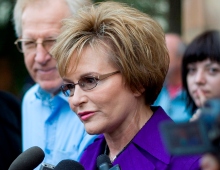Lynette Kamineth
As the internet becomes an increasingly important part of human interaction and a critical space for marginalised populations to make their voices heard (digital democracy), a woman’s inability to feel safe online is an impediment to her freedom and her basic human rights. Yet, says the writer, the problem of online violence and harassment is often overlooked in discussions on Gender-Based Violence.
Gender-Based Violence (GBV) is an age-old problem in a patriarchal society that has been brought into terrifying focus once again in recent months. Families have buried sisters, daughters, wives and mothers who have fallen at the hands of their male violators. In Women’s Month, the Film and Publication Board (FPB) and the Commission for Gender Equality (CGE) partner with a variety of organisations to advocate against online GBV, holding a magnifying glass up to the growing misuse of online platforms as a novel weapon to break down the dignity of women and girls in this digital era.
President Cyril Ramaphosa holds that South Africa is faced with two pandemics: Covid-19 and GBV. Both pandemics have only one solution: it will take a holistic societal approach, for everyone in their own little corner of the country to work together to end them.
Acting Chief Executive Officer of the FPB, Abongile Mashele, says: “The growing reach of the internet, the rapid spread of Information and Communications Technologies (ICTs) and the widespread use of social media present new ways of causing harm, paradoxically bringing new opportunities to campaign for an end to violence against women, girls and the LGBTQIA+ community.
Online GBV is real violence and has the same effect of causing psychological and in its severest form physical harm.
In the Western Cape province two teenage girls’ private photos, taken by a male friend, were posted on Facebook without their consent. In Mpumalanga five women were lured online and killed by a man pretending to offer them jobs. In Gauteng female journalists were sent death threats online, after covering various issues of alleged corruption across the country. At its worst, a primary school learner committed suicide in Pretoria in January 2019, after her personal photograph was distributed to all her school peers via a peer-to-peer application.
These are just a few examples of the many forms of online harassment that women, girls and other vulnerable groups face in South Africa and around the world. Although online violence can affect all genders it is women, girls and minority groups who experience more traumatic forms of cyberbullying such as online stalking, revenge pornography, sex-trafficking, body-shaming, receiving unwanted pornography, sexual harassment (sextortion), rape and death threats. The internet has become a channel for the objectification of women but also for paedophiles and scammers to instigate crimes such as child grooming and even human trafficking.
As the internet becomes an increasingly important part of human interaction and a critical space for marginalised populations to make their voices heard (digital democracy), a woman’s inability to feel safe online is an impediment to her freedom and her basic human rights. Yet the problem of online violence and harassment is often overlooked in discussions on Gender-Based Violence.
Research by the World Health Organisation (WHO) shows that one in three women will have experienced some form of violence in her lifetime, and despite the relatively new and growing phenomenon of internet connectivity in Africa, it is estimated that one in ten women have already experienced some form of cyber violence since the age of 15.
According to an online survey of 90 LGBTQIA+ young adults between 18 and 34 from South Africa a high incidence of exclusion, outing and harassment takes place through text messaging and various social media sites.
“Access to the internet is fast becoming a necessity for economic well-being and a mechanism for empowering marginalised groups. It is crucial therefore to ensure that this digital public space is safe for everyone, including women, girls and other gender groups,” says Ms Mashele.
As a regulator that safeguards the consumption of content through the classifying of entertainment content, the Film and Publication Board (FPB) is an important player in the protection of South Africans from content that can cause moral, psychological or developmental harm. The signing of the Films and Publications Amendment Act by the President in late 2019 secured its role in providing broader safety in the online space, with the addition of clauses to counter revenge pornography.
These amendments have significant implications for online distributors in its current form as it applies to the sale, hiring and streaming of content on various digital platforms in South Africa. A ground-breaking development is that the Act allows for accredited foreign or international classification systems to be approved by the FPB’s Council. It is a requirement that the applicant demonstrates to the FPB how the foreign or international ratings are aligned to the applicable FPB ratings and Classification Guidelines. This will start to bring alignment or what we refer to as a harmonised approach to local foreign or international classification systems.
On 27 August 2020, the FPB and Commission for Gender Equality (CGE) will host a webinar discussion on online GBV to assess research and trends in this space as well as solutions that are needed to counteract and ultimately eradicate it.
Theme: Online violence is REAL Violence
Date: 27 August 2020
Venue: Virtual Platform
Time: 10h00 – 13h00
RSVP: To receive a link to the webinar please respond to manala.botolo@fpb.org.za










